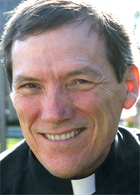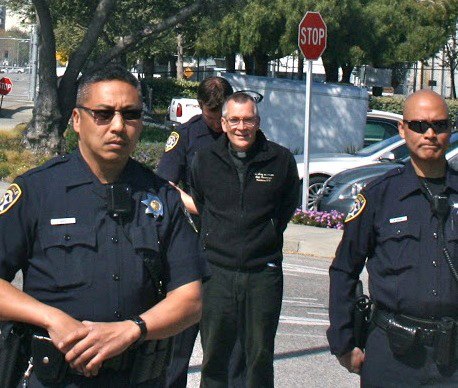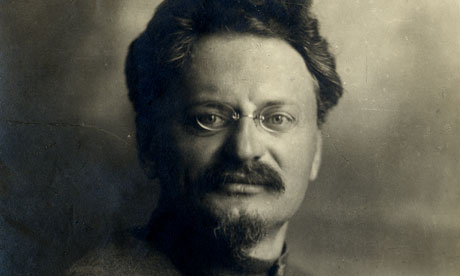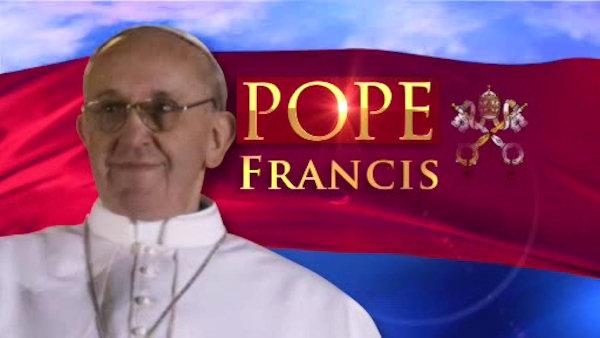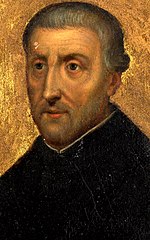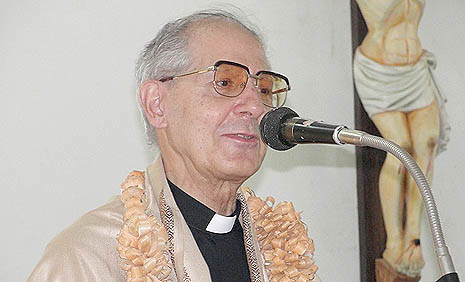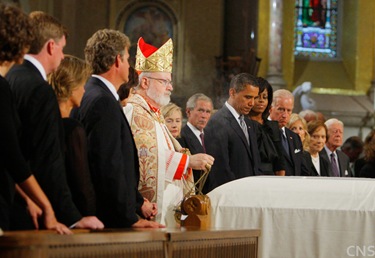 Academy Award winner William Peter Blatty, whose best-selling book and blockbuster film The Exorcist were situated at his alma mater, Georgetown University, announced today that he has delivered a “Petition” on behalf of more than 1200 alumni, students, parents, teachers, and other laity from around the world. The “Petition” prays that the Catholic Church will grant several remedies, including, if made necessary, the removal or suspension of top-ranked Georgetown’s right to call itself Catholic and Jesuit in its fundraising and representations to applicants. The Petition cites a Vatican Decree issued on July 11, 2012, at the request of the Archbishop of Lima, that ordered the Pontifical Catholic University of Peru, a very prominent Latin American university, to cease calling itself “Catholic” and “Pontifical” while declaring that it continued to be ecclesiastical property and subject to the requirements of Church law. On the order of Pope Benedict XVI, the Vatican Secretary of State, Cardinal Tarcisio Bertone, based the decision on the university’s failure to comply with Ex corde Ecclesiae, the 1990 Apostolic Constitution for Catholic Universities and that the University of Lima persists “in continuing to orient its institutional initiatives according to standards that are inconsistent with the norms and morality of the Church.”
Academy Award winner William Peter Blatty, whose best-selling book and blockbuster film The Exorcist were situated at his alma mater, Georgetown University, announced today that he has delivered a “Petition” on behalf of more than 1200 alumni, students, parents, teachers, and other laity from around the world. The “Petition” prays that the Catholic Church will grant several remedies, including, if made necessary, the removal or suspension of top-ranked Georgetown’s right to call itself Catholic and Jesuit in its fundraising and representations to applicants. The Petition cites a Vatican Decree issued on July 11, 2012, at the request of the Archbishop of Lima, that ordered the Pontifical Catholic University of Peru, a very prominent Latin American university, to cease calling itself “Catholic” and “Pontifical” while declaring that it continued to be ecclesiastical property and subject to the requirements of Church law. On the order of Pope Benedict XVI, the Vatican Secretary of State, Cardinal Tarcisio Bertone, based the decision on the university’s failure to comply with Ex corde Ecclesiae, the 1990 Apostolic Constitution for Catholic Universities and that the University of Lima persists “in continuing to orient its institutional initiatives according to standards that are inconsistent with the norms and morality of the Church.” Georgetown University is, likewise, Church property legally entrusted to the Society of Jesus nearly 200 years ago and to a civil corporation that administers it. Georgetown also received a pontifical charter that has never been abrogated.The Georgetown effort was first announced two months before the Peru decree, on the heels of an unprecedented rebuke of Georgetown and its first lay president by His Eminence, Donald Cardinal Wuerl, the Roman Catholic Archbishop of Washington, over Georgetown’s invitation to HHS Secretary Kathleen Sebelius to be a graduation ceremony speaker in may 2013.
Despite this and two petitions collecting almost 60,000 voices, Georgetown did not relent. The editors of the Archdiocesan newspaper wrote in an editorial then regarding Georgetown: “When the vision guiding university choices does not clearly reflect the light of the Gospel and authentic Catholic teaching, there are, of course, disappointing results.” The Father Kings Society’s Canon Law action, based on Georgetown’s failure for more than two decades to comply with the requirements of Ex corde Ecclesiae, was being planned even before the Sebelius scandal.
“The Scandals that Georgetown has given to the faithful are too many to count, and too many to ignore any longer,” Blatty said. “Today Georgetown is the Borgia university, reflecting more the spirit of Alexander VI, than of Archbishop John Carroll, John Henry Cardinal Newman, or Pope John Paul II. Georgetown hardly reflects that St. Ignatius who stood preaching in the pouring rains of Paris to stop young men from losing their souls for the sake of carnality,” Blatty said.
Link (here) to The Father King Society to read the full release.




